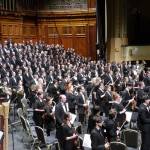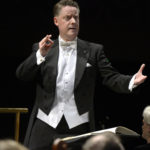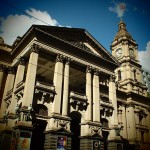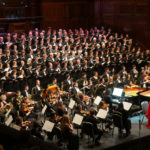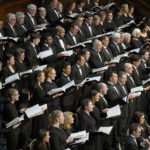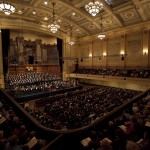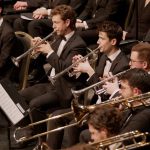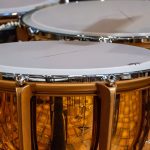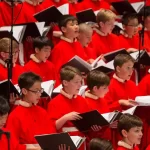HURRY! Last tickets now on sale and selling fast!
RMP is excited to present a full-scale performance of Orff’s exhilarating Carmina Burana, perhaps the most famous choral work of the twentieth century. Originally written as a cantata for orchestra, chorus, and vocal soloists by the German composer Carl Orff, Carmina Burana premiered in 1937 in Frankfurt am Main, Germany.
Shortly after the greatly successful premiere, Orff said to his publisher, Schott Music: “Everything I have written to date, and which you have, unfortunately, printed, can be destroyed. With Carmina Burana, my collected works begin”.
Orff drew his text from a 13th-century manuscript containing songs and plays written in Latin and medieval German, which was discovered in 1803 at the Bavarian monastery of Benediktbeuern. Dubbed the Carmina Burana (“Songs of Beuern”) by the German philologist Johann Andreas Schmeller, the texts present a varied view of medieval life, including sexual desire, religious verses, social satires, and bawdy drinking songs. Orff’s music is often visceral, and very reminiscent of Stravinsky’s earlier work Les noces (The Wedding) – full of primeval rhythmic intensity, and highly percussive orchestration.
The best-known movement from Carmina Burana is the dramatic “O Fortuna” (“Oh Fortune”), which serves as both prologue and epilogue. It frames the revelry of the cantata’s three main movements with a stark warning about the power of luck and fate, offering the ancient image of a great symbolic wheel of fortune that deals out triumph and disaster at random. The forceful and famous opening bars are among the grandest and most dramatic statements in all Western symphonic music.
This concert will also feature a rare performance of the epic “Choral” Symphony (No. 6) of Carl Vine – one of Australia’s most popular and widely-acclaimed composers.
Having written an impressive body of much-loved concert works and film scores, Vine composed his Choral Symphony in the grand tradition of Beethoven and Vaughan Williams. This powerful and dynamic work was first performed by the West Australian Symphony Orchestra and the WASO Collegium Choir, conducted by the composer on March 8th, 1996, at the Perth Concert Hall, Western Australia. Subsequently recorded by the Sydney Symphony Orchestra and released on ABC classics, the work received its Melbourne premiere in 1999 by Melbourne University Choral Society and Malvern Symphony Orchestra, conducted by Andrew Wailes in Melbourne Town Hall.
Vine’s dark and dramatic Choral Symphony tells the story of Creation using the myths of ancient Babylonia. Employing a massive, percussion-rich orchestra, as well as the mighty Town Hall organ, and a large choir, the work contains some truly astounding moments, from massive choral and orchestral climaxes, to spine-tingling pianissimos, exotic instrumental and percussive passages, and grand sweeping melodies that embrace the listener and maintain a mood of mystery and awe until its thrilling climax.
In Carl Vine’s own words: “I wanted this work to revel in the power of human community. There should be no soloists, and the text should relate to our basic need for religion without being overtly religious. To focus on this ‘inner’ humanity, I selected four hymns from religions long-dead, in languages that have not been spoken for thousands of years. Although there are only a handful of scholars in the world who could plumb the depth of both these languages, the sequence of phonemes, the rhythm and intent of the sounds, still resonate with our primal need to create order from chaos.”
Enuma Elish is a creation myth describing the creation of the world from primeval chaos. Although generally described as ‘Sumerian’ or ‘Babylonian’ and possibly originating before 2000 BC, this version of the myth is taken from a cuneiform tablet in Semitic Akkadian of Northern Babylonia, 1300-1250 BC. The remaining three texts are Eis Gên, Eis Selênên, and Eis Hêlion – hymns to the Earth, the Moon, and the Sun. These are taken from the Homeric Hymns (circa 400 BC), written in the centuries following Homer’s death as introductions to public readings of his great epics. They were written in Greek ‘Epic Dialect’ and have been interpreted according to Revised Classical pronunciation.
These four tracts combine to form a simple pantheon of the human condition: an account of creation followed by our relationship to the prime deities of the cosmos. Each hymn is preceded by an orchestral prelude.
Book early to ensure you don’t miss out on what promises to be one of Melbourne’s concert highlights of 2024.
Over 300 passionate and talented musicians will pack the stage and balconies of Melbourne Town Hall in a must-see event for all classical music lovers.
Andrew Wailes, conductor
Kathryn Radcliffe, soprano
Kanen Breen, tenor
Christopher Hillier, baritone
Andrew Bainbridge, organ
Royal Melbourne Philharmonic Choir
Melbourne University Choral Society
National Boys Choir of Australia
Sunday 19 May 2024 at 5pm
Melbourne Town Hall
JOIN THE FACEBOOK EVENT!
https://www.facebook.com/events/769898118394330
Proudly supported by City of Melbourne Arts Grants


